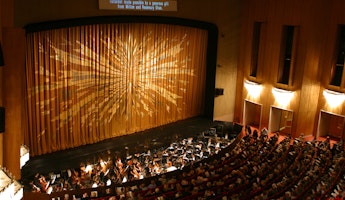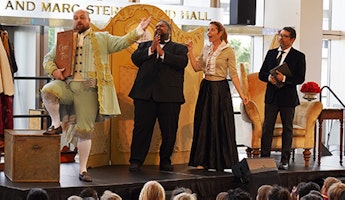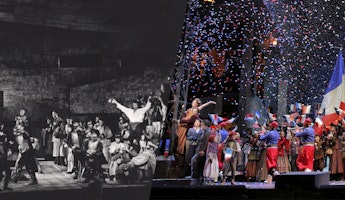Blog
November 11, 2024
Is Opera Shakespearean? Or Shakespeare Operatic?
William Shakespeare is fundamental, not only to English literature, poetry and theater, but to all of Western civilization. The eventual absorption of his works into an operatic form was a seismic event.
Digging through memories from some 50 years ago, I recall a discussion about the basic myths that have defined and motivated operatic composition. The conversation concerned myth in the broad sense of the word, not as source material for operatic theater (i.e. Greek, Roman and Nordic), but rather narratives that are substantially about a spiritual or emotional force that we commonly live by, whether or not consciously.
The legend of Tristan and Isolde had been proposed as "the" central foundation of much of Western medieval literature and, most germane to our discussion of opera. The notion that love finds its greatest expression in an all-encompassing, self-annihilating passion, appealed greatly. That appeal was absorbed, glorified and given back to the world in operatic form in 1865 through Richard Wagner's genius.
In addition to Shakespeare's intrinsic (immeasurable) worth is the secondary effect of his works serving as inspiration to the other arts. Classical music composers drew extensively from his works, in the form of operas, songs, tone poems for orchestra and solo piano pieces.
There are hundreds of works drawn from his plays. As with the tale of Tristan and Isolde, Romeo and Juliet was to become another such myth. It alone has inspired at least two dozen operas. Composers routinely redacted, shortened, or modified the theatrical originals, not to honor the "Top Bard" (W.H. Auden's term) but to serve their own particular muse, artistic needs and the often rapid, factory-like production of works for a demanding industry.
Works and worlds as divergent as Vincenzo Bellini's I Capuleti e Montecchi (Venice, 1830), Charles Gounod's Roméo et Juliette (Paris, 1867) or Leonard Bernstein's free adaptation West Side Story (premiered in Washington DC in 1957 before moving to Broadway later that year) testify to its universality.
Among other musical works inspired by the story, Berlioz wrote a choral symphony (equally inspired by Beethoven’s Ninth), Tchaikovsky composed a Fantasy Overture (1870/1886) and Prokofiev created a full-length ballet (1935/1940) Each remixed the narrative elements to their liking. Prokofiev had to be talked out of leaving the ill-starred lovers alive at the end.
The universality of these lovers proceeds from and beyond Shakespeare's text and poetry. None of the musical works is either literally translated nor fully faithful to the plot line aside from the young lovers' fate. So what is that universality, and why does it seem limitless?
Medieval Verona is only a starting point, and easily discarded. The connective tissue is the essential story of ill-starred young lovers who must navigate obstacles to their love and ultimately succumb to those forces.
The two wealthy families who have parented these young people are living out an ancient feud. They are at the source of what leads to the lovers’ deaths. The courage and beauty of this young love, which defies both parental authority and dangers posed by their own kin, is inspirational.
No society, including our own, is immune to internecine wars, racial tension, tribal and familial bellicosity. Neither were the Capulets and Montagues, who are likely stand-ins for the endless feuds in Italy between the Guelphs and Ghibellines. The Sharks and Jets of Manhattan's West Side were Bernstein's 20th-century American version.
The subject of all these iterations is tribalism, and what happens when two young people attempt to break out of their tribe to unite their lives together in love. It is tragically contemporary today.
This core dramatic narrative has superseded the story of Romeo and Juliet, becoming the essential story of much of 19th-century opera. Reduced to the barest plot, the story is that of a young couple (by tradition the soprano and tenor) who are in love, wish to be united and spend their lives on earth together, and who must struggle with opposition and obstacles to fulfill and live that love.
This increasingly becomes the model for the Italian version of Romanticism which, in contradistinction to its German roots, is far more earthbound than transcendent, far more concentrated on love and particularly the physical/spiritual love of young couples as the essence of Romantic Ideal.
Rossini, the king of 19th-century opera, entered the world first through opera buffa then became ambivalent, ultimately preferring melodramma before essentially abdicating his throne for the second half of his life. Bellini was to die tragically young, as did Donizetti, a death preceded by his final years in a state of dementia.
That was to leave Giuseppe Verdi with an open path to conquer Italy and the world with his melodramas. He introduced the element of nationalism into his operas and had an overall political and social sophistication as well, one might say Shakespearean in his breadth. He would successfully construct all of this together and attain the apex of the Italian version of Romanticism. His vision was always a true notion of the primacy of love and its experience in an unwelcoming environment. He recounts living intensely, conscious of ultimately losing the battle with the world and submitting, often unwillingly, to destiny
In removing the story of Romeo and Juliet from all of its plot-based roots and preserving just the essence of the love of two individuals in an encumbrance strewn environment, we elevate it to the status of myth, something that has wide applicability.
Through hundreds of operas written in the Italian 19th century, that situation is the common denominator. When the obstacles eventually dissolve, and the lovers live happily ever after, it is a "comedy.” When the love cannot be realized in the end because of the dominance of those obstacles in the context of a hostile environment, it is a melodrama or tragedy.
I have heard it said that Romeo and Juliet can be considered the basic "myth" of Italian opera. I believe that observation comes from the Italian writer and musicologist Massimo Mila (1910-1988), though I can no longer find the source where I read that. As I am in Rome at the moment, I went out to buy his brief history of music. I propose a short excerpt from his book as relevant to this discussion. I have freely paraphrased and translated it, as I do not know if there is a published English translation and in any case I cannot put my hands on it at the moment.
"Romanticism was born in Germany and spread through Europe, adapting itself to local circumstances...the affirmation of individualism translates itself into an intensification of feelings...entering into a more passionate and ardent climate which touches the interests and experience of ordinary people.
“Everything in Romanticism's rebellion against the omnipotence of reason that exalts sentiments, is harmonious with nineteenth century Italian music. Whereas German Romantics see the individual's greater connection to the Absolute, or the infinity of nature, everything for the Italian is constructed around the human being.
“The heart's Romantic exaltation, to the disadvantage of Reason, is understood by the Italian 19th century as the justification for the supremacy of Love."
From these short quotations, ripped out of context and freely paraphrased, we can see how the purity, naturalness, sincerity and innocence of Romeo and Juliet's love, juxtaposed against the harsh realities of life, came to represent life's essence for contemporary Italians. It accompanied and explains the gradual dominance of the human voice, dramatic poetry and theatrical values, which diminished the production and consumption of purely instrumental music.
German Romanticism saw a unity between humans in the context of transcendence and nature: babbling brooks and flowing rivers, forests and mountain peaks. The human spirit could more easily remain free with absolute music, music without text. It resisted being contained and limited by theatrical prosody.
There is barely an Italian opera that does not have some variation of the trinity of love, obstacles and destiny. It is always centered around the human experience. Even the greatest Italian sacred works, Rossini's Stabat Mater and the Verdi Requiem, are centered on the human being more than God, and they tell a story as much or more than they recite prayers.
Opera's humanity was not to be contained by reason, common sense or realism. It is an extravagant art form, with extravagant expression by often extravagant individuals.
To finish off, I want to raid another extraordinary book that I think should interest every opera fan, Gary Schmidgall's Shakespeare and Opera. I am deeply indebted to this author for the pleasure of countless hours reading and rereading his books. Fortunately, there is no need to translate this.
He sets a "carefully laid snare" at the beginning in preparing us for an in-depth look at the extraordinary chemistry of the relationship between opera and Shakespeare. A few highlights:
"Is there an art form that receives more satirical or downright derisive publicity than opera? Here is one tirade that touches the usual bases: we find, says the author, 'Nothing but death made sensational, despair made stage sublime, sex made romantic, and barrenness covered by sentimentality and... plenty of bogus characterization...At the great emotional climaxes we find passages that (rely) on symmetry of melody and impressiveness of march to redeem poverty of meaning.'
“But I hope the reader will also be a little discomfited to learn that they were aimed (by George Bernard Shaw) not at opera, but at the works of William Shakespeare.
“I fail to surprise unwary scorners of opera with Shaw's typically bold and witty assertion: ‘The truth is that instead of Otello being an Italian opera written in the style of Shakespeare (sic), Othello is a play written by Shakespeare in the style of Italian opera....With such a libretto, Verdi was quite at home: his success with it proves, not that he should occupy Shakespeare's plane, but that Shakespeare could on occasion, occupy his.’"
And a final quip from Shaw (paraphrased) that I am very fond of quoting, though like Massimo Mila's assertion that Romeo and Juliet is the fundamental myth of Italian 19th-century operatic music, I no longer remember when I first heard it.
"In an Italian opera, the soprano wants to make love to the tenor, the tenor to the soprano, and the baritone does not want to let them do that."
Reductio ad absurdum.
Shaw's words notwithstanding, that leaves a vast and flexible playing field, one which has been a fertile garden that has insured Italian opera's place into our own time.
James Conlon
November 2024








/03-cosi/_dsc0996_pr.jpg?format=auto&fit=crop&w=345&h=200&auto=format)




















